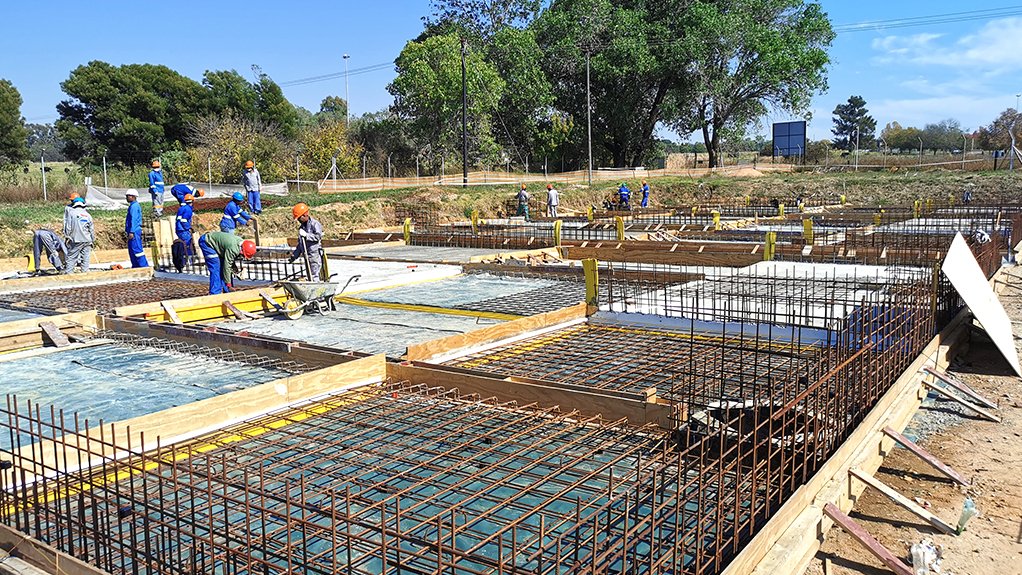
+27 11 441 1111
SRK House, 265 Oxford Road, Illovo, 2196, South Africa

Water scarcity puts wastewater under spotlight


UPGRADING VALUE Gradual increase of organic load put pressure on wastewater treatment plant capacity
Consulting engineers are playing a valuable role in supporting municipalities to upgrade wastewater treatment works (WWTWs), says consultancy firm SRK Consulting principal civil engineer and partner Tiaan Bauman, noting that this underpins vital sanitation services to communities while ensuring that only wastewater of high enough quality is discharged into watercourses.
At Kouga local municipality in the Eastern Cape, SRK Consulting recently designed and implemented an upgrade of the St Francis Bay WWTW. This had become necessary with the growth of St Francis Bay, Cape St Francis and Sea Vista communities, and was the third upgrade since the plant began operations in 1995.
In Gauteng, SRK is involved in ten wastewater treatment projects, where it is applying a range of specialised input to ensure that treatment plants operate optimally.
“Under-capacity is a challenge in many of these plants, as their hydraulic and organic loading grows over time. Volumes of wastewater coming into the plants gradually exceed their design capacity, while organic loading also varies according to the type of effluent which is treated,” he says.
Any underperformance of the plant exacerbates the results. Sub-standard performance then leads to the risk of watercourse contamination, as effluent is not properly treated before it leaves the plant. This, in turn, poses risks to both the human population and the natural environment downstream of the plant.
Importance of Upgrades
Good engineering means timeous planning and implementation of regular upgrades – expanding facilities where necessary, Bauman notes.
“Municipalities need to underpin this discipline by tracking and forecasting population numbers – to estimate the future capacity required by treatment plants. In those cases where plants cannot keep up with the demands of a steadily urbanising population, the planning departments of municipalities play a vital role in guiding the technical requirements of new or larger facilities.”
Consulting engineers collaborate closely with municipalities on this score, both in the large urban centres and in smaller towns and rural areas. The wide range of professional disciplines in the industry includes civil engineers, process engineers and water scientists – each with a vital contribution to wastewater treatment.
The necessary budgets to plan and conduct this work have long been constrained – and the result of this has been that water infrastructure has deteriorated significantly. It is hoped that government will focus attention on how additional resources can be directed to these needs, and how such resources can be efficiently applied.
Budgets under Strain
Bauman explains that there is an important role particularly for civil engineers in the consulting space, who can contribute to ongoing improvements – even when finances are constrained.
One way civil engineers can do this is to help municipalities to prioritise the spending of available budgets – using their technical insights and professional experience.
“This is best achieved with the relevant studies and audits, which will highlight the most urgent areas needing attention. It is also vital to achieve value for money, and this requires quality planning and technical skills,” he highlights.
Approaching the challenge from the point of view of what is feasible from a financial point of view can begin with a technical audit. This generates a status-quo report that details the condition of the plant and recommends what is required to improve its operation. This also lays the groundwork for a design upgrade.
“Of course, this can only be done within the context of the broader priorities that the municipality has set for itself – based on its own assessment of current and future community needs. To research, identify and prioritise these needs, municipalities need to attract, retain and develop skills in key disciplines such as town planning,” says Bauman.
Value of Maintenance
The financial position of municipalities has been negatively affected further by the Covid-19 pandemic, with lockdowns leading to job losses and even more residents unable to pay for services.
“More than ever, investment in water treatment plants needs to deliver long-term value, and an important aspect of this is regular and thorough maintenance; a municipality’s technical staff and plant operators therefore need the right training and systems in place to ensure longevity and efficiency,” says Bauman.
He explains that support in this sphere can be also be found within the consulting engineering fraternity – as they can collaborate with treatment plant managers and other technical staff.
Through being integrally involved in how these plants are designed and constructed, civil engineers can also help to plan how maintenance is done – as well as necessary scheduling. There are also the associated pumping systems and reticulation networks that need to be maintained.
As a water-scarce country, South Africa is needing to develop its capacity to provide adequate water treatment to make the best use of this valuable resource.
Civil engineers have much to offer in this process, both as employed professionals within local government, and as consultants providing specialist expertise. The profession is increasingly vital to ensuring that citizens receive the water services they deserve, he concludes.


